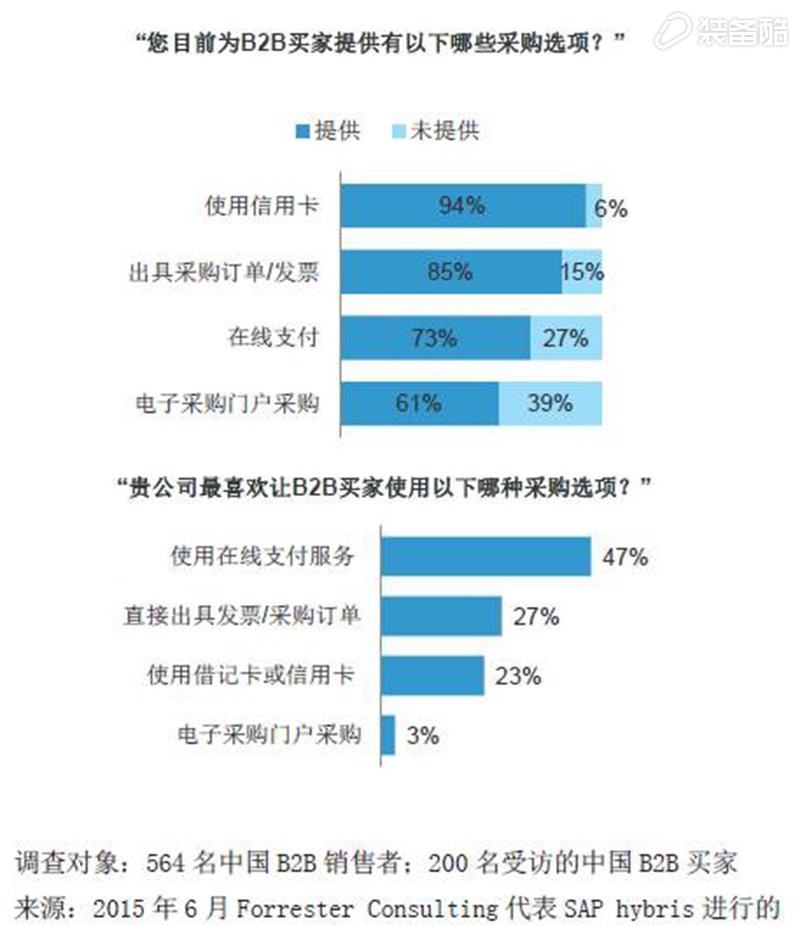The growth of Chinese companies' business-to-business (B2B) e-commerce market is rapid, and the digital behavior of B2B market purchasers has undergone tremendous changes. To win, service, and retain customers, B2B product sellers need to meet new challenges. In order to meet the increasingly prominent needs of B2B customers and keep pace with market trends, China's B2B market sellers need to adopt new technologies and deploy functions that meet customer expectations on the established e-commerce platform.
In June 2015, SAP hybris commissioned Forrester Consulting to conduct a study to explore how B2B buyers' expectations can change how suppliers sell and deliver in China. To further understand the needs of current and emerging markets, Forrester verified the following assumptions:
As the B2B e-commerce market grows in China, B2B sellers must accelerate their digital transformation through technology platforms in order to achieve a B2C-style shopping experience to meet the increasing demands and expectations of buyers.
Forrester conducted an in-depth investigation of both B2B marketers (B2B product buyers and B2B product sellers) in order to gain a comprehensive and in-depth understanding. Forrester interviewed 564 China B2B online sellers online business decision makers. They come from all walks of life: automotive, high-tech, manufacturing, consumer products, life sciences, distribution, retail, and oil and gas industries. In addition, Forrester interviewed 200 online business decision makers of B2B e-commerce buyers in China. They are from multinational companies, state-owned enterprises, government departments, and other listed companies and private companies.
The annual returns of these decision-makers are between RMB 200 and RMB 5 billion, and they hold various leadership positions in the e-commerce department, including the CEO, chief marketing officer, and vice presidents at all levels, as well as a business or function. Directors and managers.
Key findings
Forrester's research has four major findings:

The strong growth of China's B2B e-commerce market has brought unlimited business opportunities to B2B companies.
Insightful market sellers have insight: To win more market share, we must seize the opportunity to plan technology investments in advance. Therefore, online channels will gradually mature, and gradually occupy the dominant position in the B2B business area.
B2B market buyers expect to get a B2C shopping experience and omni-channel visibility.
B2B seller companies that provide business-to-consumer (B2C) shopping experiences can meet the growing needs and expectations of Chinese B2B buyers. At the same time, omni-channel capabilities and visibility can help B2B sellers better cope with the changing needs of buyers.
B2B marketers face digital challenges in the transition process.
B2B buyers need not only a consistent, personalized shopping experience, but also the cross-channel visibility enjoyed by consumers in the B2C market. Effectively attracting customers is a new challenge for B2B sellers.
B2B market sellers must accelerate the pace of digital strategic investment to meet the needs of Chinese buyers.
Customer loyalty depends on the omni-channel user experience. Customer loyalty is closely related to its shopping experience. When B2B sellers design e-commerce platforms, they only pay more attention to customer experience and omni-channel work to stand out.
B2B e-commerce business growth in China is strong
B2B e-commerce has begun to dominate China's B2B market. Chinese B2B purchasers expect to increase their online shopping transactions significantly in the near future. At the same time, sellers will cater to the needs of buyers, and online sales will also play an increasingly important role in all major industries. In order to better cope with the transfer of sales channels from offline to online, and to meet the expansion needs of online businesses, B2B sellers have adopted a variety of online payment models. In addition, B2B sellers have begun to deeply integrate B2B e-commerce platforms and key business systems to promote the seamless and efficient growth of online B2B businesses.
Chinese B2B buyers hope to substantially increase their online shopping transactions in the near future.
China's B2B purchasers with online shopping transactions accounting for more than 25% of the total shopping transaction volume are expected to double within three years, reflecting the rapid growth and large scale of online shopping in China's B2B market (see below). B2B companies that have been delaying the implementation of e-commerce will face great risks because B2B buyers will soon be shopping more online.
Online sales channels are increasingly important for B2B sellers in various industries in China.
Most of the B2B sellers surveyed expect to be more optimistic about the revenue and scale of online sales next year (see below). The B2B sellers surveyed in various industries agreed that online sales will increase more or less. These industries include rolled products, wholesale distribution, consumer products, and oil and gas and mining.
Diverse online payment methods make the e-commerce business more convenient.
Today's B2B customers expect network-centric customer interactions to become more complete and comprehensive, while online payment methods are key self-service tools for achieving this goal. The two preferred payment methods for B2B purchasers are online payment services (such as Alipay) and invoices or orders sent directly to them. Today, B2B sellers can provide customers with a variety of payment methods, which will inevitably help attract empowered commercial buyers and promote online business growth (see below).

E-commerce platforms are becoming the core of B2B sellers' integration of existing business systems.
80% of Chinese companies believe that e-commerce platform must integrate with financial, ERP and other back-end systems, of which more than 60% of B2B sellers have used some forms of B2B e-commerce solutions as their order management system (OMS), And the logistics platform for warehousing, freight forwarding and order fulfillment (see below). Obviously, it is necessary for B2B companies to integrate two-way integration of the interactive system (B2B e-commerce platform) with the enterprise record transaction system. In addition, the e-commerce platform needs flexible workflow capabilities to design custom business processes that are consistent with the existing operating model. B2B sellers will need to choose an e-commerce platform that combines a powerful solution architecture and flexibility.
The intelligent experience brought by the cloud-source business, in today's increasingly powerful e-commerce platform, it is bound to play its advantages and become the industry's first march.
Source: Internet, edited and published by equipment cool, reprint please indicate the source!
Disclaimer: This article is reproduced on the Internet. If copyright is involved, please contact us!
Natural Hair Wigs,Wigs With Bangs,Brown Wig,Ponytail Wig
Hangzhou Shibode Technology Co., Ltd. , https://www.inblooming88.com